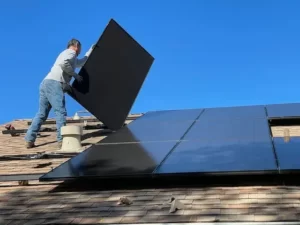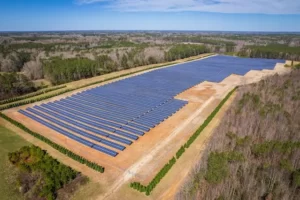
Have you ever considered how the sun’s generous rays can be harnessed to power your home but felt daunted by the initial investment in solar panels? You’re not alone.
The prospect of going green with solar energy is an exciting one, yet the financial aspect can often appear as a substantial hurdle. As you weigh your options, it’s essential to understand that there are multiple avenues to make this environmentally friendly upgrade more affordable.
From government incentives and rebates that can significantly lower costs to various financing plans tailored to different budgets, the path to solar conversion is lined with opportunities for savvy planning.
In the following sections, we’ll explore the intricacies of these options, helping you to navigate the financial landscape of solar panel installation, and ultimately, to make an informed decision that aligns with your economic circumstances.
Listen To The Summary
Assessing Your Budget
Before diving into the solar panel investment, it’s essential to carefully evaluate your financial situation to ensure it aligns with your energy goals and budget constraints. You’re on the brink of making a decision that could redefine your energy independence, but let’s get the numbers straight first. Conducting a thorough cost analysis will lay the groundwork for smart spending and long-term savings.
Consider the upfront costs against potential energy efficiency gains. Imagine slashing your electricity bills and the satisfaction of contributing to a cleaner planet. But, don’t get swept up by the glow of those solar panels just yet. Crunch the numbers. How long will it take for the energy savings to offset the initial investment? This break-even point is critical to your decision.
Moreover, factor in potential maintenance expenses and the lifespan of the equipment. Will you need a loan, or do you have the capital to invest outright? Financing options can offer flexibility, but they come with their own set of considerations, such as interest rates and loan terms.

Your path to energy freedom is unique, and a personalized budget assessment is the compass you need. Make an informed choice, your wallet and the environment will thank you.
Exploring Incentives and Rebates
Having assessed your budget for solar panel investment, it’s equally important to investigate the array of incentives and rebates that can significantly reduce your out-of-pocket costs. You’ll be delighted to learn that the financial journey to energy independence doesn’t hinge solely on your initial capital. Instead, it’s bolstered by lucrative tax credits and state programs designed to propel you toward freedom from traditional energy constraints.
Let’s zero in on the federal investment tax credit (ITC), which allows you to deduct a substantial percentage of your solar panel installation costs from your federal taxes. This can translate to thousands of dollars in savings, making solar energy a smarter investment than you initially thought.
Moreover, don’t overlook state-specific incentives. Many states offer additional tax credits, rebates, or even performance-based incentives that pay you for the electricity your solar panels produce. These local benefits can stack with federal ones, compounding your savings.
But here’s the kicker—these incentives won’t last forever. They’re often designed to stimulate the market until solar energy becomes the norm. So, your move towards solar shouldn’t wait. Capitalize on these financial perks and embrace the liberating shift to renewable energy while the sun shines on these opportunities.
Comparing Financing Options
As you explore the solar landscape, it’s crucial to weigh your financing options, from loans to leases, to ensure you choose the path that aligns with your financial goals. Your Credit Score plays a pivotal role in determining which doors are open to you. A higher score may unlock better interest rates and terms, granting you the latitude to embrace solar energy without straining your budget.
Consider these vivid scenarios:
- Imagine the sun’s rays as currency, showering down on your rooftop, transforming into immediate savings with a solar loan that you’ve secured thanks to your solid credit history.
- Envision your roof as a chessboard, where each solar panel is strategically placed, financed by a lease agreement that requires no upfront costs, leaving your capital free for other ventures.
- Picture a scale, balancing your monthly expenses with the predictable costs of a solar power purchase agreement (PPA), where you pay for the energy produced, not the panels.
- Visualize a piggy bank, gradually filling as you leverage state and federal incentives to reduce the overall cost of your solar investment.
Lease agreements offer the allure of little to no upfront costs, but they can also mean less freedom to modify your system later. It’s about finding the balance that lets you harness solar freedom on your terms.
Selecting the Best Financial Option
When it’s time to decide on the best financial option for solar panels, you’ll want to consider your long-term energy savings against the initial investment required. It’s about striking that perfect balance between upfront costs and the promise of decreased utility bills.

Moreover, your solar creditworthiness plays a pivotal role. Just like any other financial endeavour, your credit score can impact the terms of loans or leases available to you, so it’s crucial to have that in good standing.
As you ponder your options, think about the investment returns of purchasing outright versus financing. When you buy solar panels outright, you’re looking at a larger initial expense, but the savings start accumulating quickly, leading to a quicker break-even point.
On the other hand, if you opt for a loan or a lease, you may have little to no upfront costs, but you’ll need to factor in the interest or ongoing payments.
Reviewing Solar Panel Providers
Before you commit to a solar panel system, it’s essential to thoroughly evaluate potential providers, ensuring you receive the best quality, service, and value for your investment. The freedom you’re seeking from the grid starts with choosing a partner who’ll support your vision every step of the way.
When reviewing solar panel providers, consider their:
- Solar ratings: Look for high-performance scores from independent industry assessments.
- Provider portfolios: Examine past installations for quality and customer satisfaction.
- Customer reviews: Seek out testimonials and feedback to gauge real-world experiences.
- Warranty and support: Ensure they offer robust protection and help after installation.
Visualize the panels on your roof, a testament to self-reliance and eco-conscious living. The provider you choose should mirror your commitment to a sustainable future. They must be transparent about their products and upfront about costs. Think long-term; a provider with a solid track record can offer peace of mind that’s priceless.
Education is your ally. Dive deep into solar ratings and dissect provider portfolios. You’re not just buying panels; you’re investing in a lifestyle. The right provider will empower your journey, helping you harness the sun’s energy, and secure your energy independence.
Frequently Asked Questions
How Do Fluctuations in Energy Prices Affect the Long-Term Financial Benefits of Solar Panels?
Energy price fluctuations can impact your solar panels’ benefits, but you’ll gain energy independence and investment stability, making you less vulnerable to market swings and ensuring long-term financial freedom.
Can Installing Solar Panels Impact My Property Insurance Premiums or Coverage Terms?
Yes, installing solar panels may lead to insurance adjustments. You must do a coverage evaluation to ensure you’re protected. This step secures your investment and sustains your quest for energy independence.
Are There End-Of-Life Costs or Recycling Programs for Solar Panels, and How Do They Affect Total Financial Planning?
You’ll need to consider panel lifespan and disposal regulations in your financial planning, as they impact end-of-life costs and recycling options, ensuring your freedom to manage expenses effectively over time.
How Does the Installation of Solar Panels Influence My Property Value and Marketability When Selling My Home?
Installing solar panels can boost your property value with a solar premium and add green cachet, enhancing marketability, and offering you the freedom to command a higher price when selling your home.
What Are the Financial Implications of Technological Advancements in Solar Panels Over the Next Decade?
As solar technology advances, you’ll likely see significant cost reductions and more investment incentives, offering you greater freedom to harness clean energy and save money in the long term.
Conclusion
You’ve crunched the numbers and explored incentives—now it’s time to choose your best financing fit.
Whether it’s a loan, lease, or PPA, select what aligns with your budget and goals.
Don’t forget to vet your solar panel provider carefully; after all, this is a long-term investment.
With the right financial option, you’ll be soaking up the sun’s power and savings in no time.
Go on, make that bright decision for your wallet and the planet!



